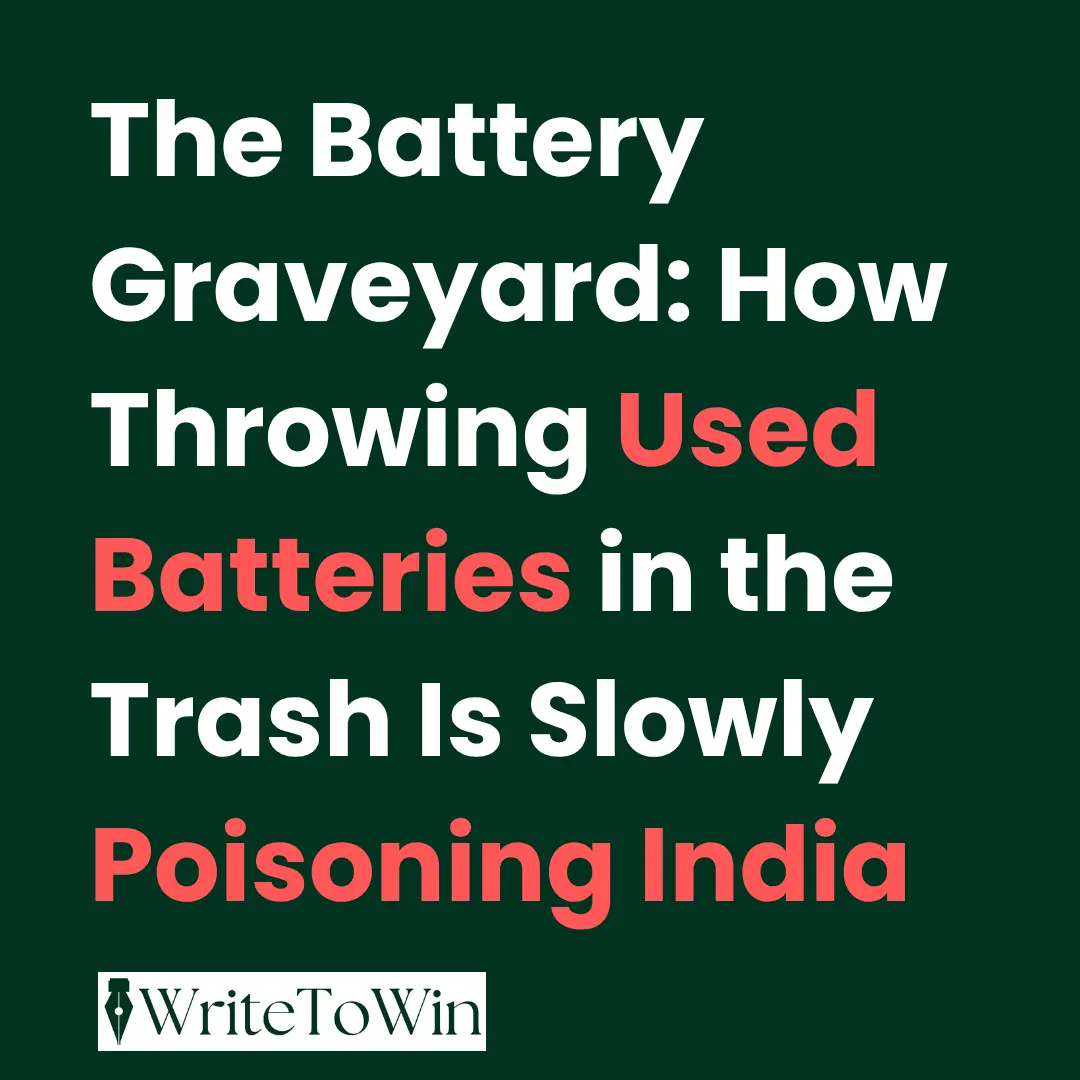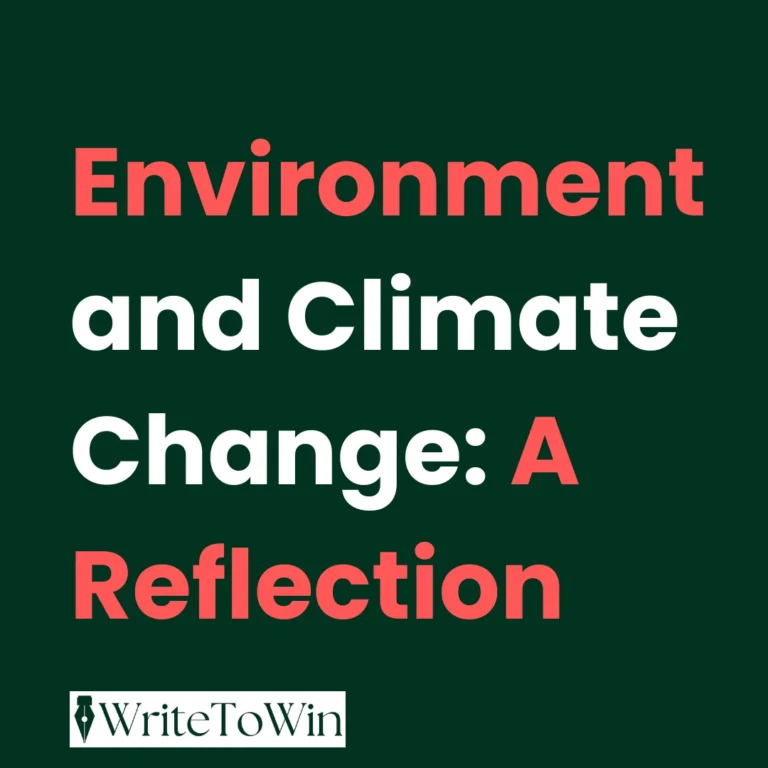Batteries are everywhere. From the AA batteries that power your TV remote to the massive leadacid batteries in inverters and vehicles, we depend on them daily. As India grows into a tech savvy, digitized, mobile nation, battery usage is skyrocketing. But with this convenience comes a dark and dangerous consequence that most people are unaware of what happens after a battery dies?
This article explores why discarding batteries in regular garbage is dangerous, how it impacts health and environment, and what every citizen especially students and young people can do to help India transition to safer, sustainable battery disposal practices.
In millions of Indian households, dead batteries are thrown straight into the dustbin, along with kitchen waste, paper, and plastics. It’s a common habit. It feels harmless. But in reality, it is one of the most toxic actions we commit against the environment, silently and daily.
What's Really Inside a Battery?
Most people see batteries as small, sealed objects that stop working after a while. But few realise they are chemical storage devices and what’s inside them is often highly toxic.
Used batteries can contain any of the following hazardous substances:
Lead – Found in car and inverter batteries; extremely poisonous to the brain and nervous system.
Mercury – Used in button and coin cells; causes severe neurological damage.
Cadmium – Present in some rechargeable batteries; damages the kidneys and bones.
Lithium, cobalt, nickel, manganese, copper Found in mobile phone and laptop batteries; these metals are toxic in excess and flammable under certain conditions.
Sulfuric acid – The corrosive liquid inside lead-acid batteries, which can burn skin and leach into the ground.
These chemicals are not biodegradable, and many of them remain active in soil and water for decades. Even a single AA battery can contaminate over 100,000 liters of water if not disposed of properly.
How Trash Becomes a Toxic Time Bomb
When batteries are thrown into normal household waste, they often end up in landfills, open dumps, or are burnt with other garbage. In all three cases, the results are hazardous.
Leaching into Soil and Water
As batteries corrode in landfills, toxic metals seep into the soil. These metals eventually find their way into underground water sources, the same water that irrigates crops, fills borewells, or supplies urban water tanks.
In farming regions of Punjab and Uttar Pradesh, where groundwater use is heavy, such contamination can mean toxic metals entering the food chain. Long-term exposure to metals like lead or cadmium through water or crops is linked to cancer, developmental delays in children, infertility, and birth defects.
Polluting the Air
In some towns and villages, garbage is burned to reduce volume. When batteries are burnt along with other waste, they release toxic gases and heavy metal fumes, which can cause respiratory problems, skin rashes, and long-term lung diseases.
Burning lithium-ion or nickel-cadmium batteries can release dioxins and furans some of the most toxic compounds known to science. These pollutants also contribute to airborne heavy metal contamination, which can travel kilometers in wind and settle on water bodies, crops, and skin.
Risk of Fires and Explosions
Lithium-ion batteries common in mobile phones, laptops, and power banks can explode or catch fire if crushed, punctured, or exposed to heat. In garbage trucks and waste segregation centers, this leads to fires that damage property and injure workers.
In 2022, several fires were reported in waste collection trucks in cities like Bengaluru and Pune, directly linked to lithium batteries mixed with dry and wet waste.
The Scale of the Crisis in India
India is the world’s third-largest producer of electronic waste, and batteries form a large portion of this toxic load. According to recent estimates, India generates over 50,000 tonnes of battery waste annually, and that number is growing with the rise of electric vehicles, solar power banks, and digital devices.
Despite this, battery recycling awareness is shockingly low. A study by the Centre for Science and Environment (CSE) found that more than 90% of Indians throw batteries in the dustbin.
Many towns and cities still lack separate battery collection infrastructure. Informal e-waste handlers often use unsafe methods, exposing themselves and nearby residents to toxic fumes and contaminated runoff.
Even in metro cities like Delhi, Mumbai, or Chennai, most citizens are unaware that throwing batteries in the bin is illegal under India’s E-Waste (Management) Rules.
Health Hazards Are Closer Than You Think
Lead poisoning, mercury exposure, and cadmium toxicity may sound like distant science problems. But they’re already affecting Indian lives.
In Gujarat’s e-waste recycling hubs, studies have found elevated blood lead levels in children, linked to unsafe battery dismantling.
In rural Jharkhand, abandoned lead-acid battery workshops have poisoned local groundwater, making it unsafe for agriculture and drinking.
In some informal battery recycling units in Delhi NCR, workers handle acids and metals with bare hands, resulting in severe burns, lung diseases, and long-term damage.
These are not isolated incidents they are early warnings.
If we don’t act now, India’s toxic footprint from batteries will grow into an irreversible health crisis.
What Can You Do?
The problem may seem large, but the solution starts small. Every household, every school, and every citizen can make a difference.
Don't Throw Batteries in the Bin
Never discard used batteries whether AA, phone, laptop, inverter, or button cell in regular garbage. Keep them in a separate, clearly marked container.
Use E-Waste Collection Points
Many Indian cities have e-waste collection centers that also accept batteries. Big electronic retail stores like Croma, Reliance Digital, and Apple authorised stores often have battery take-back options. Some NGOs and local civic bodies also organise battery collection drives periodically.
Tape and Store Safely
Before storage or drop-off, tape the terminals of lithium, 9V, or large batteries to prevent accidental sparking. Store them in a dry, cool place away from heat or flame until you can dispose of them properly.
Join or Organise Collection Drives
Schools and RWAs (Resident Welfare Associations) can organise local battery collection campaigns in collaboration with NGOs or recyclers. Even a small awareness booth during parent-teacher meetings or community events can have big impact.
Spread Awareness
Talk to your friends, family, teachers, and community members about battery hazards. Share posts online. Write articles, draw posters, and use your creativity to educate others.
The Power of Youth and the Pen
Recently, a school student from Kochi submitted a powerful essay on battery pollution to the national-level WriteToWin.online competition, a platform encouraging students to speak up about the environment and climate change.
Her story wasn’t just well-researched it was heartfelt. She wrote about her grandmother who used to burn garbage, including batteries, in their backyard and how she helped her family understand the danger, change their habits, and start a neighborhood recycling group.
This is what real change looks like. One voice. One story. One spark.
The WriteToWin initiative shows us that writing is a powerful tool for awareness and activism, especially among the youth. Through stories, reflections, and facts, students can educate thousands and become real environmental leaders in their communities.
Why This Matters Now More Than Ever
India is on the verge of a battery revolution. Electric vehicles, solar energy, wireless devices, and smart homes are all increasing our dependence on battery power. This is a sign of progress.
But if we don’t plan for what happens after those batteries die, that progress will come at the cost of our health and future.
We cannot afford to create a silent graveyard of toxins beneath our feet. It’s time to transition to a culture of responsible battery use, collection, and recycling before it’s too late.
Be the Spark
You may not be able to fix India’s waste systems overnight. But you can make one important choice: what you do with your next dead battery.
Will you toss it into the bin and forget about it? Or will you store it safely, speak up, educate others, and dispose of it the right way?
Every change begins with awareness. Every movement begins with one voice. And if you’re ready to make a difference, even through a simple act of writing maybe your story will be the one that inspires thousands more.
If you’re a student who wants to use writing as a tool for change, the WriteToWin.online competition is accepting entries on environment and climate awareness. Your voice matters and it just might lead others toward action.
Let’s not bury our batteries. Let’s bury the ignorance around them.
India’s future is in your hands don’t let it leak away.

Siddharth champions the planet with a voice that’s as engaging as it is thoughtful. Through his articles, he turns complex environmental issues into relatable stories, inspiring people to take action without feeling overwhelmed. Blending passion with practical solutions, he explores how small, consistent choices can shape a more sustainable future. One step, one reader at a time.







